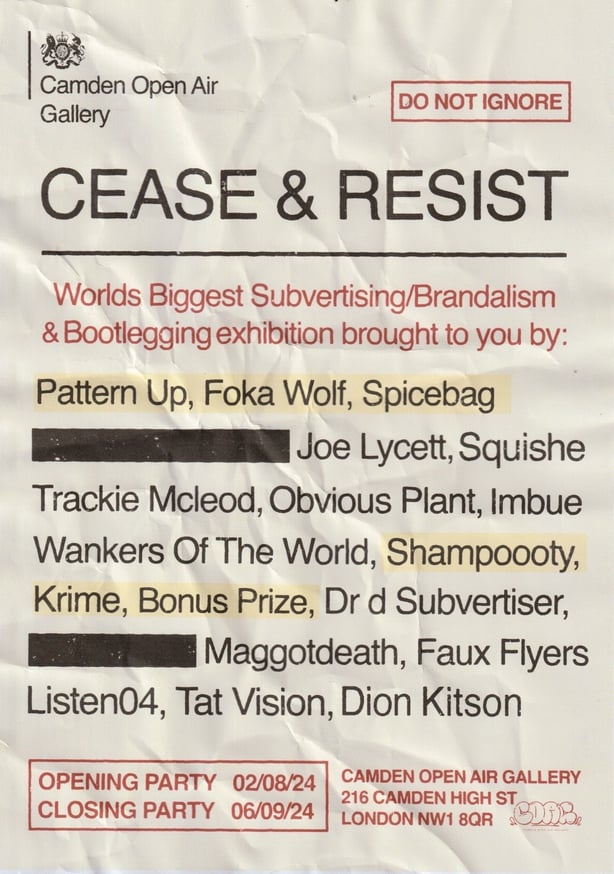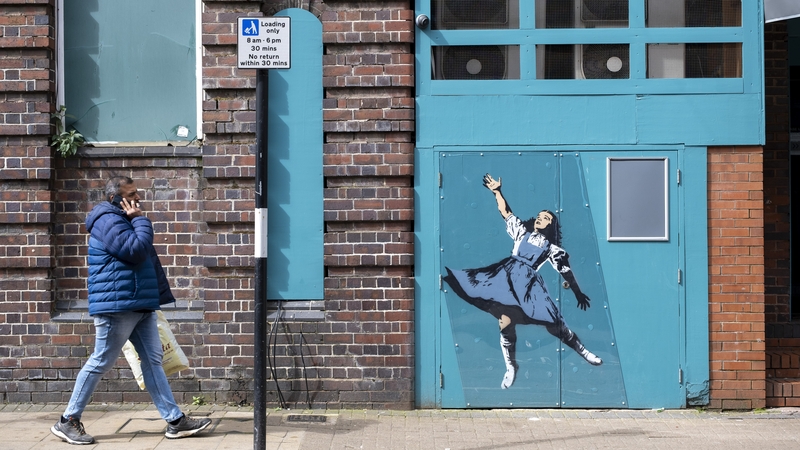Pattern Up and Spice Bag are two of the artists working with Joe Lycett to create something special in London this August. Kate Demolder writes.
Amid the flurry of consumer-led billboards on London's Camden High Street, promoting cheaper insurance, audaciously-priced cold pressed juices and the new in-store deal at Wagamama, a collective of artist-activists have collated an exhibition, Cease & Resist, in the Open Air Gallery that engages with subvertising [a portmanteau of subverting advertising]; the practice of making spoofs or parodies of corporate and political advertisements.
'Subvertising', a term first coined by American writer Mark Dery in 1991, is the illicit practice of intervening in urban advertising space, from graffiti scribbles and removed adverts, to full-blown billboard takeovers and digitally hacked adverts.
"It's prime time to talk about it right now," Graham*, an anonymous member from Pattern Up, a collective involved in the exhibition, says. "Everyone has been affected heavily by commercialism, capitalism, and the powers that uphold them. Big businesses have been exploiting everyone left, right and centre, regardless of what it really means.

"Bernard Arnault, the CEO of LVMH [Louis Vuitton Moët Hennessy; the French multinational holding company and conglomerate specialising in luxury goods] is one of the richest men in the world, and we kind of believe that we should really question what that really means for society at large."
Cease & Resist came about as a result of a conversation between Graham and Foka Wolf, another artist involved in the exhibition.
For some time now, both of their work has revolved around subvertising and the questions the practice raises. "We've been connected with the Camden Open Air Gallery for a while," he says. "And they're really keen for projects that kickstart conversations. So we got in touch with loads of other artists we know to ask if they would be involved, and thankfully, most of them said yes."
The work of 17 artists is set to be displayed, including that of comic-cum-presenter Joe Lycett, who, in a bid to prove no one can own the word "boss" back in 2022, officially changed his name via deed poll to Hugo Boss, has proved his chops for the sport.
"Joe is only showing one or two prints I think," Graham says. "Everyone else is providing three. We made an allowance for him because he's pretty busy at the moment."
We need your consent to load this Instagram contentWe use Instagram to manage extra content that can set cookies on your device and collect data about your activity. Please review their details and accept them to load the content.Manage Preferences
Founded by members with personal experiences of criminal exploitation, Pattern Up is an anonymous collective ("we prefer not to say how many of us there are, so people can come and go") inspired by German theatre practitioner, playwright, and poet Bertolt Brecht that uses art to spotlight critical social and political issues.
Originally focused on raising awareness about child exploitation in organised crime, their work - largely satirical art pieces featured on billboards, fly-posters and the side of buildings - has since expanded to tackle topics like drug addiction and the cost of living crisis.
Recent takes have included a fake Chanel perfume ("English Channel") to make a point about Southern Water "dumping untreated sewage water on 10,000 occasions," and a bogus betting shop they set up at 2023's Glastonbury Festival, entitled "BrokeLads" to bring light to exploitation and addiction in gambling.
"A lot of the group were wrapped up in selling drugs," Graham says. "And we noticed how young people can get caught up in that lifestyle because a lot of the people we idolised-–rappers, musicians, even people older than us––were all about that fake lifestyle of designer clothes and luxury cars.
"It kind of got us thinking about the meaning behind wearing certain symbols and what messages they portrayed. It began to feel like cult-like, and one that was profiting off the darkest aspects of society at that."
We need your consent to load this Instagram contentWe use Instagram to manage extra content that can set cookies on your device and collect data about your activity. Please review their details and accept them to load the content.Manage Preferences
Joining them in the exhibition is Irish artist Adam Doyle, known under the moniker Spice Bag, whose work has regularly sparked national conversation.
In 2023, his bracing Eviction Print––a reworking of Cork artist Daniel MacDonald's 19th-century painting depicting an eviction during the Great Famine to depict masked Gardaí and bailiffs on Dublin's Frederick Street––was created in response to Ireland's ongoing housing crisis and was subsequently discussed on Prime Time.
His second piece "You Are Now Entering Free Iceland," a mural he created with Pattern Up, was painted in solidarity with striking supermarket workers on Dublin's Talbot Street. He also recently was asked by the organisers of the Bloody Sunday March to create a homage to the Palestinian plight on the face of the Free Derry Wall.
We need your consent to load this Instagram contentWe use Instagram to manage extra content that can set cookies on your device and collect data about your activity. Please review their details and accept them to load the content.Manage Preferences
For it, he painted the words "If I Must Die / Let It Bring Hope," two lines from a 2011 poem by the late Palestinian poet and professor Refaat Alareer.
"I wanted to be involved [in Cease + Resist] as I don't think that type of thing has kicked off in Ireland that much," Doyle says, the sole Irish person involved in the project.
"Pattern Up actually taught me the word subvertising, but the idea of playing with brands has been around for a while now. One of the first art books I had mentioned Andy Warhol and Roy Lichtenstein, and I just remember the idea of using established imagery and kind of subverting it and making something new.
"It's something I've definitely incorporated into my work, An Garda Síochána, Dublin Bus, that kind of thing. In Ireland, there can be a real nostalgia or comfort attached to certain brands," he says.
"And with that nostalgia comes a thought back to the time they first witnessed it, before the cost of living crisis, or before things felt so hard. It can really get people thinking, whether they even realise it or not."

The history of subvertising spans millennia. Indeed, the practice is arguably as old as the spaces on which it's materialised.
According to Thomas Dekeyser's study Dismantling the Advertising City: Subvertising and the Urban Commons to Come, in the first centuries BC, inscriptions promoting gladiatorial battles in Pompeii would commonly be tampered with humorously with thought-provoking rhetoric.
With the commercialisation of spray paint came more regularly documented occurrences, like in 1958 when The Situational International, a group of intellectuals and artists, launched their inaugural journal discussing the concept of 'détournement' as the integration of artistic production into cultural spheres to denounce their validity.
A decade later, in Paris, protesters found billboards to write the following: "Your desire is fictional, a function of consumption; I spend so I am."
We need your consent to load this Instagram contentWe use Instagram to manage extra content that can set cookies on your device and collect data about your activity. Please review their details and accept them to load the content.Manage Preferences
A better-known form of subvertising might perhaps be Keith Haring, whose 1980 New York City-centric art sometimes saw him paint directly over adverts, or draw his famous characters in white chalk across subway advertising spaces.
Or indeed the best-known street artist, Banksy, who in 2005 spray-painted the words 'The joy of not being sold anything' on an empty billboard in London. (The week I write this, Banksy confirmed that a small boat crossing artwork at Glastonbury festival depicting festival-goers as travelling migrants was his, following criticism from high-profile Conservative ministers Home Secretary James Cleverly and Deputy Prime Minister Oliver Dowden.)
Cease & Resist hopes to exist along the same path, making use of a collection of large prints of different works from each artist along with fake products, installations and sculptures that all have subvertising attributes along with comic political satirist aesthetics.
We need your consent to load this Instagram contentWe use Instagram to manage extra content that can set cookies on your device and collect data about your activity. Please review their details and accept them to load the content.Manage Preferences
"The aim is to flip the narrative of recognisable designs and make people think," Graham says. "It gives us great satisfaction to express our views on certain subjects, while also trying to make people laugh. I think, when you're laughing at something, you actually take it in far deeper than you would if it was just plain information."
To try and make serious points about the excesses of consumer culture and the perilous state of the environment, Pattern Up and their peers risk potential legal action by subverting public advertising space.
"It's a grey area," he smiles. "A lot of us have been stopped by the Old Bill, but there's not really much they can do apart from removing it. Late last summer, we worked with Spice Bag to flyposter signs that designated certain areas as heroin and crack-permitted states.
"We used the council's branding and police branding––both downloadable from the internet––and things kicked off. I read a few pieces on them at the time, where reporters spoke to local police forces to see what they thought, and each of them said they were "looking into it," whatever that means.
"They know as well as we do that addiction is a massive issue, and we're just highlighting that to get everyone thinking."
We need your consent to load this Instagram contentWe use Instagram to manage extra content that can set cookies on your device and collect data about your activity. Please review their details and accept them to load the content.Manage Preferences
Subvertising is not a household term for most, but among the artistic and the anti-establishment, it is a method of colossal repute. It also maintains its influence by attending to the discreet status anxiety of the buyer who already has everything.
"We work off commission," Graham says when I ask how they make money if their work––like the exhibition––is consistently free to view.
"We sell prints, sculpture pieces and whatever else to keep ourselves alive. But we also get commissioned by people who are looking for things that aren't already out there."
As for their work in the upcoming exhibition, Doyle hopes the group appeals to those who don't traditionally find themselves in artistic spaces.
"I want people to engage with it, who didn't go to art schools or hang out with that industry," he says. "I think it's accessible that way, the barrier of entry is quite low. There's a lot to be said for art like this," he says. "How it leaves some sort of impression. And when it comes from an image that's already familiar and eye-catching, that can really leave an impact."
Cease + Resist runs, free of charge, from August 2 in Camden's Open Air Gallery for five weeks.
*Names have been changed to preserve anonymity.
NB: In both Ireland and the UK, uncontrolled graffiti is criminal damage and against the law.

